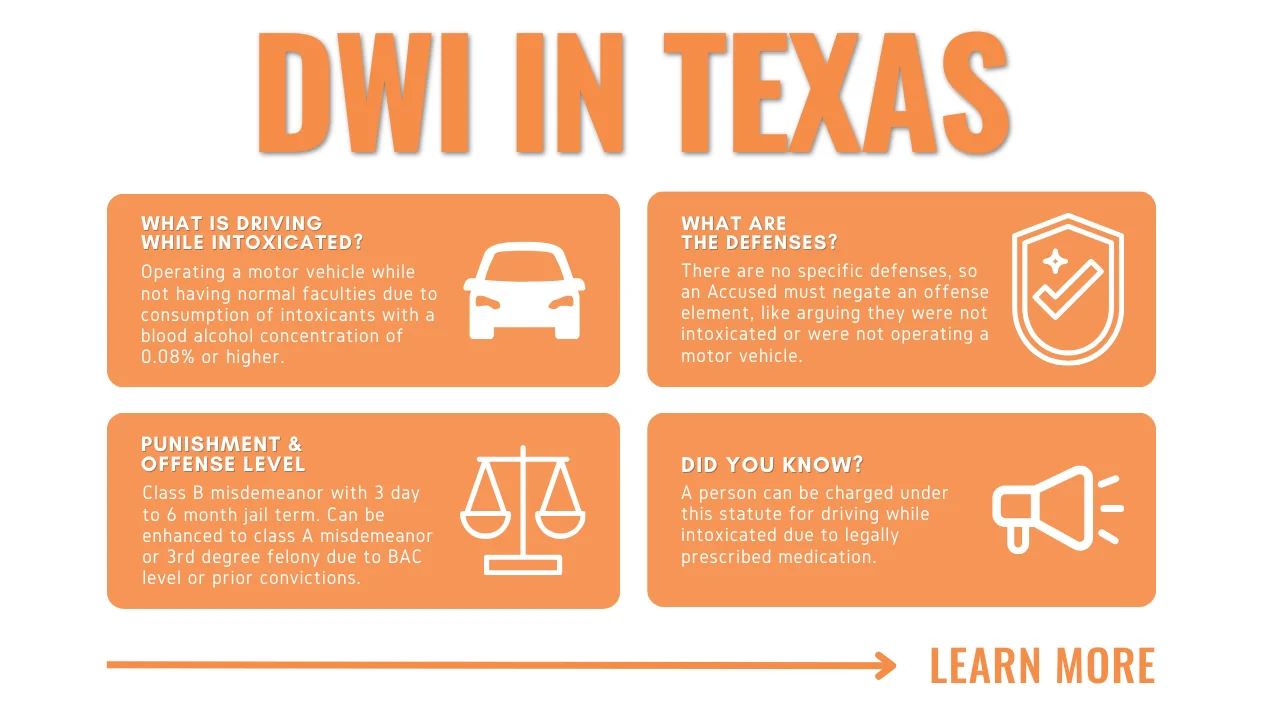
DWI is a severe offense for Texas teachers. The State Board for Educator Certification (SBEC) certifies teachers in Texas, and can impose disciplinary sanctions for criminal violations, including DWI. This is because the SBEC enforces an Educators Code of Ethics that also requires compliance with all state and federal law. Learn more.
- What happens if you get a DWI as a teacher in Texas? If a teacher gets a DUI in Texas they can be temporarily suspended or lose their teacher certification in some instances. Disciplinary rules generally focus more on teachers with two or more DWI violations within a year. However, the Board does have discretion to impose discipline for a single DWI in Texas. Teachers who disregard disciplinary requirements risk suspension of their teaching certificate in Texas.
- Can a teacher be fired for DWI in Texas? Yes, teachers can be fired for DWI in Texas depending on the severity of the offense. Texas employers are subject to varying priorities and unique expectations. A school may just decide they don’t want to deal with the negative publicity of a severe DWI and fire the teacher. Learn more.
CAN I BE A TEACHER WITH A DWI IN TEXAS?
Yes. A DWI does not prevent a person from becoming a teacher in Texas. However, even a single DWI arrest can result in disciplinary action by the state teaching board, including required drug or alcohol counseling. Multiple DWI offenses, including Felony DWI, can result in more severe discipline and even permanent cancellation of a Texas teaching certificate in some instances. Learn more.
- Will I lose my teaching job with a DUI in Texas? Some employers may not want to deal with the public blowback of a DUI and will simply choose to fire a teacher. In some instances a DUI can lead to a teaching license suspension which would make a teacher ineligible for teaching employment in Texas.
- Can a teacher be fired for being drunk? Yes, Texas prohibits educators from being under the influence of alcohol (BAC over 0.04) on school property or during school activities with students present. Additionally, repeated Public Intoxication or DWI offenses can lead to disciplinary action, teaching certificate suspension, and loss of employment in some instances. Learn more.
HOW HARD IS IT TO GET A TEACHING JOB WITH A DUI?
Texas school districts have differing guidelines toward DUI offenses. Some may have strict policies concerning criminal offenses. Importantly, educators must abide by all SBEC disciplinary requirements or risk losing their teaching credentials, which would make them ineligible for a teaching job in Texas.
- Can you have a criminal record and be a teacher in Texas? Yes, a person can be a teacher with a record in Texas. However, a criminal offense may lead to disciplinary requirements that must be strictly followed. Additionally, an educator may be ineligible for a teacher certification due to some criminal offenses, including sexual crimes, and improper relationships with students.
CAN YOU BE A TEACHER WITH A MISDEMEANOR IN TEXAS?
A misdemeanor will not always prevent a person from being a teacher in Texas. However some misdemeanors will result in disciplinary action that must be complied with in order to maintain a teaching certificate. Learn more.
The Texas State Board for Educator Certification maintains a list of offenses it considers directly related to teaching and with which it is particularly concerned in disciplinary proceedings:
- Crimes involving moral turpitude;
- Crimes involving sexual or physical abuse of a minor or student or other illegal conduct with a minor or student;
- Solicited or engaged in sexual conduct or a romantic relationship with a student or minor;
- Any crime for which the underlying facts would support a felony conviction for possession, transfer, sale, distribution, or conspiracy to possess, transfer, sell, or distribute any controlled substance;
- Crimes involving school property or funds;
- Crimes involving an attempt by fraudulent or unauthorized means to obtain or alter any certificate or permit that would entitle a person to hold or obtain a position as an educator;
- Crimes that occur wholly or in part on school property or at a school-sponsored activity; or
- Two or more crimes committed within a 12-month period that involve public intoxication, operating a motor vehicle while under the influence of alcohol or disorderly conduct.
WHAT DISQUALIFIES YOU FROM BEING A TEACHER IN TEXAS?
Serious criminal offenses can permanently disqualify an educator from being a teacher in Texas. These include Murder, improper relationships with students, most sexual offenses, and distributing controlled substances on school property. Learn more.
- What can get you fired from teaching in Texas? A teacher can be fired in Texas for certain criminal offenses, including DWI in some instances. An educator may also be fired for fraudulent misappropriation of school resources, embezzlement, or for improper relationships with students.
- How can a teacher lose their license in Texas? The State Board for Educator Certification (SBEC) can suspend a teaching certificate for serious criminal offenses like Murder and Sexual Assault. The SBEC can also suspend licenses for less serious offenses, like DWI, where an educator neglects to comply with disciplinary requirements. Learn more.
DO TEACHERS HAVE TO REPORT ARRESTS IN TEXAS?
School districts in Texas are generally free to make their own policies as to what hiring and employment criteria to use. However, all educators are legally subject to criminal background checks prior to SBEC certification and employment in Texas. Learn more.
- Texas teacher background check requirements? The Texas Education Agency (TEA) conducts criminal background checks on all applicants for teaching certification. Additionally all educators must complete fingerprint checks prior to employment. Learn more.
- How far back does a fingerprint background check go for teachers in Texas? A fingerprint background check reveals all criminal offenses regardless of date for teachers in Texas. However, a fingerprint background check will not reveal offenses subject to an Expunction. Learn more.
CAN YOU BE A TEACHER WITH A DOMESTIC VIOLENCE CHARGE IN TEXAS?
A domestic violence charge in Texas will result in disciplinary action by the SBEC and can result in suspension of a teaching certificate in some instances. The board can consider a wide range of factors in determining sanctions, including the nature and severity of the offense and any mitigating circumstances. However, the board can also propose alternate sanctions like family violence counseling in lieu of suspension.
- What is the 45 day rule for teachers in Texas? Teachers are required to resign a contract no later than 45 days before the first day of school instruction although a district may release a teacher voluntarily after that date. Teachers who abandon contracts without proper cause are subject to suspension by the SBEC.
CAN YOU STILL GET A JOB WITH A DWI IN TEXAS?
Yes, a DWI will not itself bar employment for Texas teachers. An educator may be subject to disciplinary action by the SBEC, however. Teachers who disregard SBEC requirements can lose their certification and job in Texas.
- How long does a DUI conviction stay on your record in Texas? A DUI conviction is permanent and stays on a Texas criminal record for life. However, some DUI offenses may qualify for an Expunction, which destroys all records of the case, or for a nondisclosure order.
- How do I get my DWI dismissed in Texas? The best odds for beating a DWI is with an experienced DWI defense that is well-versed in intoxication science and investigations.
TREY PORTER NAMED BEST LAWYER IN DWI DEFENSE
Trey Porter is a dynamic advocate, nationally recognized for his work in DWI Defense. He has been voted by his peers as a best lawyer in the field of Criminal and DWI Defense every year since 2015. Recognized by SuperLawyers, Mr. Porter has also been distinguished as a Top 40 Under 40 Criminal Defense Lawyer by the National Trial Lawyers Association. Mr. Porter holds a Superb rating from AVVO, where attorneys are rated based on skillful litigation, client satisfaction, peer endorsements, and positive results.
















